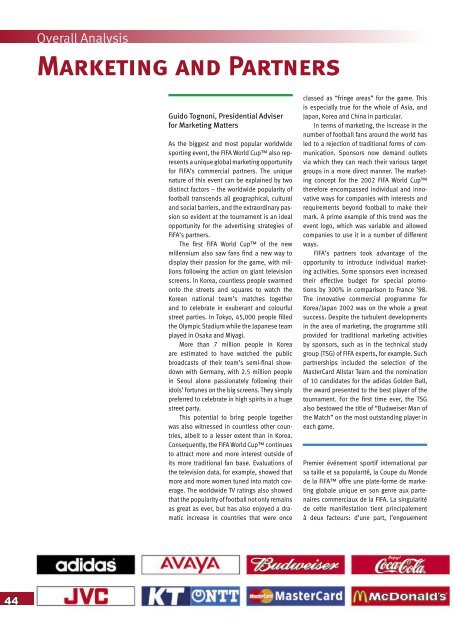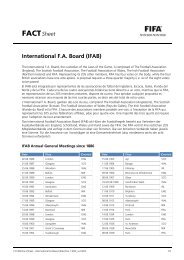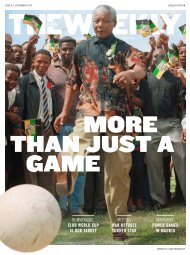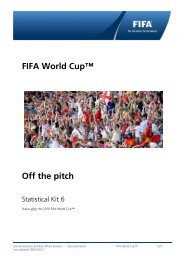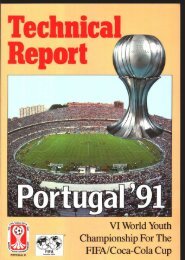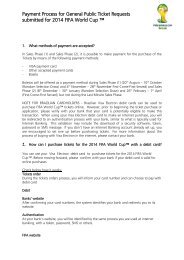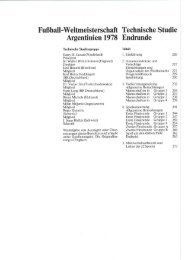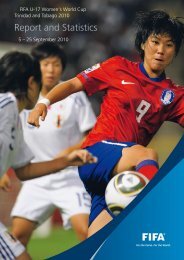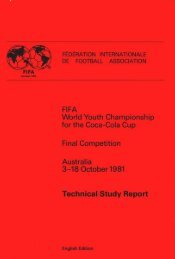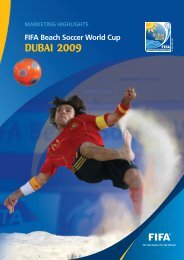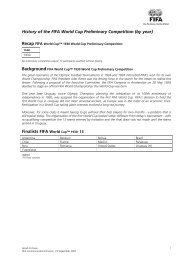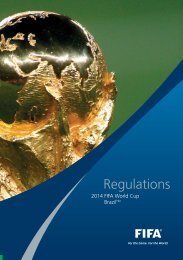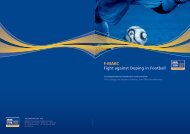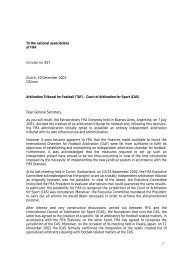You also want an ePaper? Increase the reach of your titles
YUMPU automatically turns print PDFs into web optimized ePapers that Google loves.
44<br />
<strong>Overall</strong> <strong>Analysis</strong><br />
Marketing and Partners<br />
Guido Tognoni, Presidential Adviser<br />
for Marketing Matters<br />
As the biggest and most popular worldwide<br />
sporting event, the <strong>FIFA</strong> World Cup also represents<br />
a unique global marketing opportunity<br />
for <strong>FIFA</strong>’s <strong>com</strong>mercial partners. The unique<br />
nature of this event can be explained by two<br />
distinct factors – the worldwide popularity of<br />
football transcends all geographical, cultural<br />
and social barriers, and the extraordinary passion<br />
so evident at the tournament is an ideal<br />
opportunity for the advertising strategies of<br />
<strong>FIFA</strong>’s partners.<br />
The first <strong>FIFA</strong> World Cup of the new<br />
millennium also saw fans find a new way to<br />
display their passion for the game, with millions<br />
following the action on giant television<br />
screens. In Korea, countless people swarmed<br />
onto the streets and squares to watch the<br />
Korean national team’s matches together<br />
and to celebrate in exuberant and colourful<br />
street parties. In Tokyo, 45,000 people filled<br />
the Olympic Stadium while the Japanese team<br />
played in Osaka and Miyagi.<br />
More than 7 million people in Korea<br />
are estimated to have watched the public<br />
broadcasts of their team’s semi-final showdown<br />
with Germany, with 2.5 million people<br />
in Seoul alone passionately following their<br />
idols’ fortunes on the big screens. They simply<br />
preferred to celebrate in high spirits in a huge<br />
street party.<br />
This potential to bring people together<br />
was also witnessed in countless other countries,<br />
albeit to a lesser extent than in Korea.<br />
Consequently, the <strong>FIFA</strong> World Cup continues<br />
to attract more and more interest outside of<br />
its more traditional fan base. Evaluations of<br />
the television data, for example, showed that<br />
more and more women tuned into match coverage.<br />
The worldwide TV ratings also showed<br />
that the popularity of football not only remains<br />
as great as ever, but has also enjoyed a dramatic<br />
increase in countries that were once<br />
classed as “fringe areas” for the game. This<br />
is especially true for the whole of Asia, and<br />
Japan, Korea and China in particular.<br />
In terms of marketing, the increase in the<br />
number of football fans around the world has<br />
led to a rejection of traditional forms of <strong>com</strong>munication.<br />
Sponsors now demand outlets<br />
via which they can reach their various target<br />
groups in a more direct manner. The marketing<br />
concept for the 2002 <strong>FIFA</strong> World Cup<br />
therefore en<strong>com</strong>passed individual and innovative<br />
ways for <strong>com</strong>panies with interests and<br />
requirements beyond football to make their<br />
mark. A prime example of this trend was the<br />
event logo, which was variable and allowed<br />
<strong>com</strong>panies to use it in a number of different<br />
ways.<br />
<strong>FIFA</strong>’s partners took advantage of the<br />
opportunity to introduce individual marketing<br />
activities. Some sponsors even increased<br />
their effective budget for special promotions<br />
by 300% in <strong>com</strong>parison to France ’98.<br />
The innovative <strong>com</strong>mercial programme for<br />
Korea/Japan 2002 was on the whole a great<br />
success. Despite the turbulent developments<br />
in the area of marketing, the programme still<br />
provided for traditional marketing activities<br />
by sponsors, such as in the technical study<br />
group (TSG) of <strong>FIFA</strong> experts, for example. Such<br />
partnerships included the selection of the<br />
MasterCard Allstar Team and the nomination<br />
of 10 candidates for the adidas Golden Ball,<br />
the award presented to the best player of the<br />
tournament. For the first time ever, the TSG<br />
also bestowed the title of “Budweiser Man of<br />
the Match” on the most outstanding player in<br />
each game.<br />
Premier événement sportif international par<br />
sa taille et sa popularité, la Coupe du Monde<br />
de la <strong>FIFA</strong> offre une plate-forme de marketing<br />
globale unique en son genre aux partenaires<br />
<strong>com</strong>merciaux de la <strong>FIFA</strong>. La singularité<br />
de cette manifestation tient principalement<br />
à deux facteurs: d’une part, l’engouement


